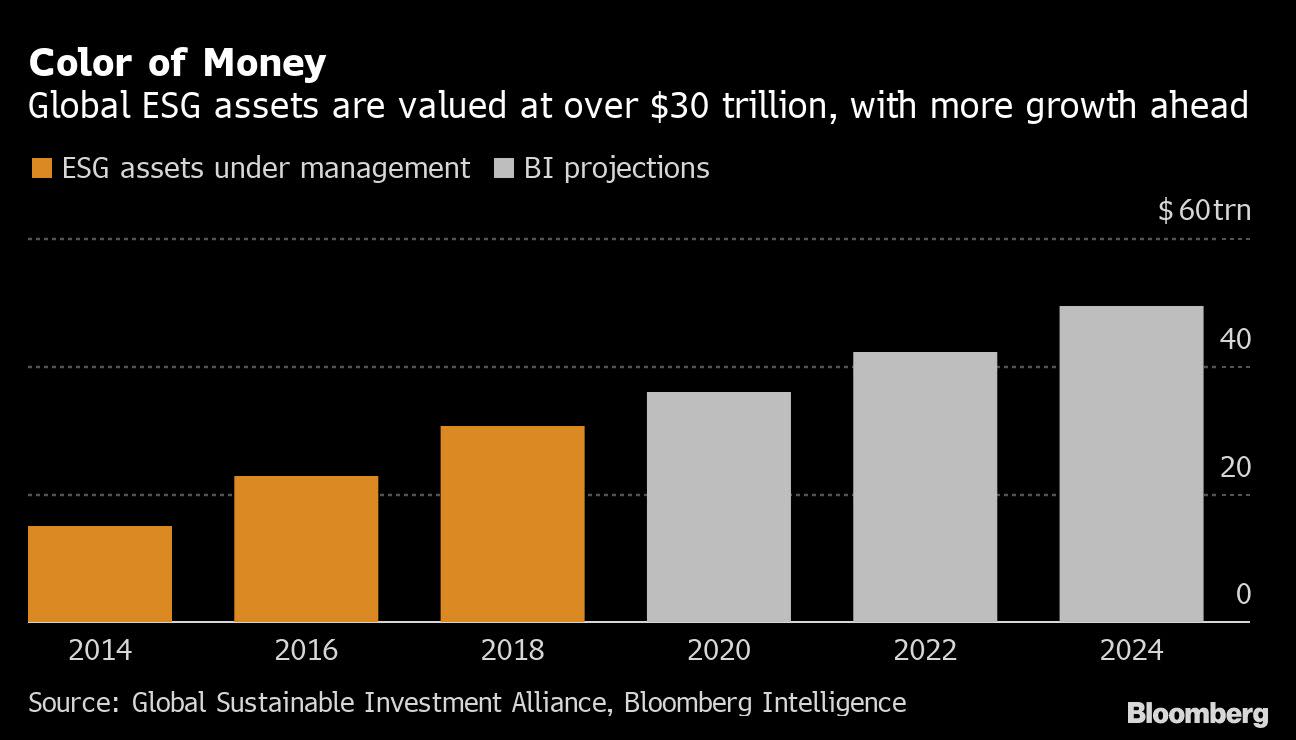
(Bloomberg) — The world’s largest underwriter of green bonds plans to significantly expand its offering of investment products touting environmental, social and governance metrics, as Wall Street starts attaching the label to more complex financial services.
JPMorgan Chase & Co. says its decision to add the ESG tag to derivatives is part of a strategy to link sustainability to all forms of finance. The bank intends to replicate a novel cross-currency swap with Italian energy company Enel SpA, in which both parties need to meet specific ESG targets or face additional costs.
Competitors are also pushing into the trendy and lucrative space, with Deutsche Bank AG and NatWest Markets seeking to attract business with ESG currency and rates hedges. The development has raised questions around how effectively such products actually help in reducing greenhouse gas emissions or promoting equality. But JPMorgan says the goal is to make ESG ubiquitous across finance.
The “essence of ESG derivatives” is “giving clients the ability, and hopefully eventually a sense of obligation, to consider ESG in every step of their financial risk management,” said Tom Prickett, co-head of EMEA rates at JPMorgan in London. “It’s providing the ability to incorporate impact into every area of clients’ financing, rather than restrict it to a small number of specific instruments like green bonds.”
Green and ESG bonds are already well established, with sales headed for a record $1 trillion this year. But Wall Street’s embrace of sustainable finance in more exotic markets shows that a field once considered niche has now become mainstream. Bloomberg Intelligence estimates that ESG products will make up well over a third of the world’s $140 trillion of assets by 2025.
Read More: SG ETF Inflows Increase 6.2% to $1.61B in Past Week
ESG currency derivatives are like standard over-the-counter contracts designed to manage a company’s foreign-exchange and interest-rate risks, but they tie the price of the swap to sustainability goals. They’re similar to sustainability-linked debt, in which an issuer’s borrowing costs rise or fall based on pre-specified targets.
U.K. renewable energy company Drax Group Plc recently entered into an ESG loan as well as ESG derivatives to hedge currency exposure, with the terms of both contracts linked to pre-determined annual carbon-intensity reduction targets. It’s looking to extend ESG-linked agreements to other derivatives, said Lisa Dukes, who oversees corporate finance and derivatives at Drax.
“The aim is to make sure we keep ESG at the core of our thinking,” she said in an interview. “Even small incentives can encourage big changes in behavior. That’s the mindset we’re trying to promote, so the primary goal is not around financial benefit. It’s not significant sums of money we’re looking at, but it’s meaningful enough to care about.”
Other unusual ESG products to hit the market this year include a green hedge created by Deutsche Bank for renewable company Continuum Energy Levanter Pte. Deutsche Bank says it was the first of its kind because the pricing wasn’t contractually linked to ESG targets. Instead, the label comes from it hedging the currency exposure of Continuum’s green U.S. dollar bond.
There’s no contractual difference between this “green hedge” and a normal hedge, or between green bonds and vanilla bonds, according to Claire Coustar, global head of ESG for fixed income and currencies at Deutsche Bank in London.
“The ultimate goal of this would be some sort of greenium, whether that be market capacity expansion or better pricing,” Coustar said. “Over time, through the verification process, we’d be developing a market that could potentially go out to a broader universe of counterparties to hedge, whether it be market risk or credit risk.”
The structure hasn’t yet been replicated, making it unclear whether this was a label too far in a market already full of jargon.
Raising Concerns
The proliferation of derivatives with an ESG label is raising questions about their impact, as even established corners of the market get criticized for setting targets that are too easy to achieve.
“While some of these products bring hedging opportunities to a growing sustainable finance market, the additionality of derivative products on the pathway toward a low-carbon economy is questionable,” said Maia Godemer, a sustainable finance associate at BloombergNEF. “They do not raise any additional funding to finance the transition.”
Still, the International Swaps and Derivatives Association expects the ESG derivatives market to catch on.
“More trading in ESG-related derivatives can facilitate price discovery, transparency and market efficiency,” said Olga Roman, head of research at ISDA in New York. But without “standard key performance indicators to determine sustainability goals across various transactions, pricing of these unique characteristics for each deal can be challenging.”
JPMorgan, meanwhile, sees itself as an ESG-derivatives pioneer. It says its initial swap with Enel in October was the first of its kind because both parties have targets and the so-called sustainability premium — effectively a pricing discount — swings both ways. Enel completed similarly-structured deals with four banks including JPMorgan in July, according to a person familiar with the matter.
“If something good can be achieved and client behavior influenced so that we see a significant impact on some of these ESG targets, then it’s worth the extra effort,” said Johannes Banner, JPMorgan’s head of European corporate FX and rates sales in London. “There’s no point in putting a wrapper around a transaction just for the sake of it.”
For now, it’s clear there isn’t “an abundance” of ESG-linked derivatives deals compared to other forms of sustainable financial products, said Bernard Coopman, global head of ING Groep NV’s client solutions group, which has closed four such transactions.
“But this is where the market is headed,” he said. “The most important thing is that the goals have to be measurable, serious, auditable and impactful.”
(Adds details of Enel swaps in fourth-to-last paragraph.)
More stories like this are available on bloomberg.com
Subscribe now to stay ahead with the most trusted business news source.
©2021 Bloomberg L.P.

